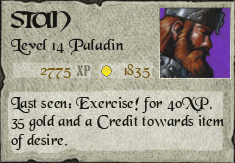Last week's discussion of character touched on something that I think I should deal with more fully before I move on. Developing a character's backstory is just one aspect of prewriting, which is essentially "what you do before you write the story."
Before this goes too far, I want to be clear that it is perfectly legitimate to begin work on the story before stepping back and engaging in what we call "prewriting." When an idea strikes, it may do so with action or dialogue, and there is no reason to forego getting that down simply because it would be "out of order."
The main idea of prewriting is getting the rough idea out of your head and into a notebook or text file. This frees up your mind to develop the idea further since you no longer have to worry about keeping everything in your memory. And that's really the point of prewriting, to get major aspects of your story worked out at the beginning so there is less to worry about in revision.
Obviously character is one of those major aspects that needs to be addressed - personalities, backstory, physical appearance, and relationships are all things that need to be considered ahead of time to make the story believable. But character isn't the only thing that needs to be considered.
It is important for the writer to be aware of the story's setting - the locations the characters inhabit and the props they interact with. The setting has tremendous potential for symbolism, but in the prewriting phase the writer only needs a general idea of the way things are set up. For example, if the story involves three characters on a road trip, the size of the car is more important to consider in the prewriting phase than the vehicle's color or the scenery. Three people driving across the country in a Volkswagen Golf are going to behave much differently than three people in a conversion van because of space difference, but are not likely to be affected by whether the exterior paint is blue or black.
The writer also needs to have a loose handle on where the story is going. This is an area that I strongly recommend against spending a lot of time on in the prewriting phase because it is likely to undergo the most drastic changes throughout the writing process. Still, it helps to have an idea about the situations that the characters may face in the story, even if those situations ultimately become irrelevant because of choices the characters make.
Basically the point of all of this is to establish a framework to build the rest of the story around. It will make it easier to maintain consistency within the work if the world and the characters are laid out for easy reference. Ultimately, this will reduce the stress that comes with revision because there will be fewer mistakes to correct.
Challenge: Create an environment. Then create two or three characters. Write a rough outline of what will happen if those characters are dropped into that environment.
Subscribe to:
Post Comments (Atom)



No comments:
Post a Comment